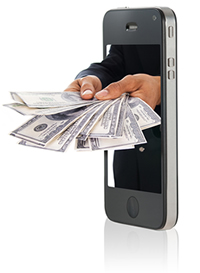Universal Secure Registry LLC (USR), a mobile payment security technology and identity authentication company founded by Kenneth Weiss, the inventor of the technology behind the SecurID tokens now owned by RSA, today announced licensing availability of its patented electronic wallet technology to third parties including credit card companies, wireless carriers, banks, retailers and others. The USR electronic wallet does not transmit sensitive information from or store exploitable information in the mobile device.
 Weiss founded USR in 2000 while he was in the application process for the core USR patent that was filed in March 2001. The company had been operating in stealth mode since while it conducted in R&D and filed additional patents. Formally incorporated in 2007, USR came public with its story in March 2011. Why? The company says it has been waiting for certain claims to be allowed on key patents that are core to achieving critical mass of intellectual property and patented technology. Weiss currently holds twenty-two (22) U.S. patents and numerous foreign patents, and others pending to address identity theft, secure financial transactions (eliminating multiple credit cards), and what the company says is a substantially improved replacement for the SecurID card/fob.
Weiss founded USR in 2000 while he was in the application process for the core USR patent that was filed in March 2001. The company had been operating in stealth mode since while it conducted in R&D and filed additional patents. Formally incorporated in 2007, USR came public with its story in March 2011. Why? The company says it has been waiting for certain claims to be allowed on key patents that are core to achieving critical mass of intellectual property and patented technology. Weiss currently holds twenty-two (22) U.S. patents and numerous foreign patents, and others pending to address identity theft, secure financial transactions (eliminating multiple credit cards), and what the company says is a substantially improved replacement for the SecurID card/fob.
Leveraging its patented 3+ FACTOR SECURITY™ system, USR’s enabling identification technology makes mobile payment transactions fast, convenient, and secure. “The future of the mobile payment market is being defined now and tunnel vision piecemeal solutions will only retard the inevitable,” said Kenneth Weiss, CEO and founder, USR.
The company says that unlike other electronic payment technologies being tested or introduced by companies such as Google and Isis, private or sensitive information is not stored on the mobile device or transmitted at the point of sale (POS) with USR. The USR electronic wallet provides a convenient and reliable way to authenticate identity with three factors quickly. It integrates the convenience of a mobile phone with the security of a protected remote server. This enabling technology acts as a trusted agent for personal transactions including mobile payments, financial transactions, tolls, vending machines, computer/network/cloud access, physical access, licenses and all privileges associated with identity.
Some benefits of USR’s electronic wallet technology include:
• No sensitive information stored on phone or transmitted
• Secure – 3+ FACTOR Security that identifies, rather than verifies, user identity
• Scalable – Relatively low cost, easily implemented on all mobile phones and POS terminals and integrates with existing infrastructure
• Versatile – Transactions may be completed via NFC, Bluetooth, cellular network, or Wi-Fi
• Convenient – Integrates interpersonal financial transactions, direct consumer-to-vendor funds transfer and credit and debit card payments
• Flexible – Trusted agent for wide range of services and applications where reliable identification is required
• Universal – One convenient integrated application used for electronic wallet, interpersonal funds transfer, computer/network access, and access to physical facilities
The USR electronic wallet uses near field communication (NFC) and Bluetooth and provides a secure, remote universal electronic repository for personal, private, and sensitive information; integrating the convenience of a mobile phone with the security of a protected remote server to act as a trusted agent for personal transactions including mobile payments and funds transfer, computer/network/cloud access, and access to physical facilities.
“Using their smartphone as an e-wallet, consumers can minimize carrying and keeping track of traditional plastic cards yet enjoy all the benefits that traditional debit cards provide. For merchants and service providers, using their smartphone as a mobile payment acceptance device gives unprecedented freedom to securely accept payment in the field or to help alleviate long checkout lines in store,” notes Christopher Justice in a SecurityWeek column.
According to Frost & Sullivan, the total payment value for NFC globally will reach more than 110 Billion Euro in 2015.












